Earlier this month, Chris and I spent a number of days away, exploring our neighbouring islands of Islay and Jura. The trip had originally been booked for the end of June, to coincide with the summer solstice and the longest day. The summer nights up here are very precious to me, the quality of light is extraordinary and I wanted to experience that on Jura, a place that was special to us already without having seen it for reasons of its literary legacy. It is well known that George Orwell went to Jura to find the seclusion he needed to work on his final novel, unarguably his masterpiece. I knew it would be difficult for us to gain access to the house itself but I was determined to try.
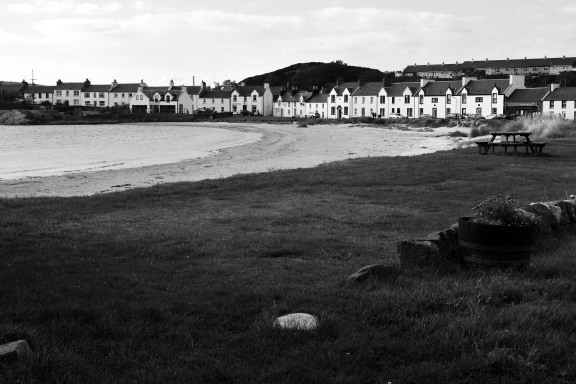
As things turned out, we did not get to see Barnhill; neither did we get to spend the summer solstice on Jura. That we were able to reschedule our trip and almost get to Barnhill seems something of a miracle, given the circumstances. Staff at the hotel where we were staying made enquiries about us taking a boat trip down the coast so we could glimpse the house from the water but on our one full day in Jura, the weather was ridiculously inclement (always a possibility when you’re in Scotland) and the boatman was having trouble making even his scheduled trip across from the mainland.
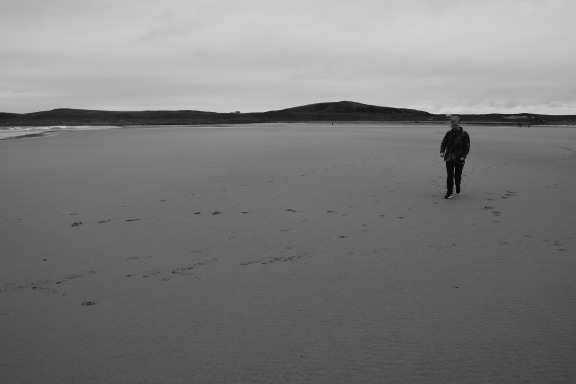
We drove instead, as far as we could – twenty-five miles along an increasingly tenuous strip of road and into a landscape I had scarcely imagined. I knew in my head that Barnhill farmhouse was isolated and inaccessible, but it wasn’t until we were in the landscape that I was able to appreciate just how much. I think I’d been imagining a bumpy track along the coast, something like the farm roads we were used to in Devon. In fact, the road turns inward, away from the coast and into the vast, moorland interior of the island. Stags leap across the road in front of the car. Mist sweeps in like bolts of gauze. The colours – those quintessentially Scottish colours of ochre and sage and grey, contoured with purple. The heather – at its finest when I travelled north just a fortnight before (another trip, another story) – was still in evidence, still everywhere. That particular purple, with that particular grey – glorious, favoured, northern.
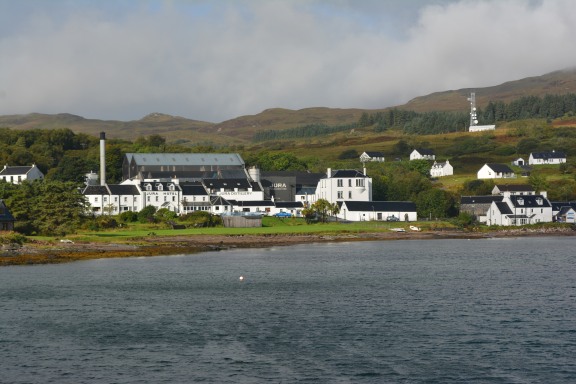
In the end we reached the point where the road seemed so precarious it would have been foolhardy for us to continue. Chris parked, or rather, brought the car to a standstill overlooking the valley. I left him listening (appropriately enough, given my work-in-progress, but more of that another time) to Science Stories on Radio 4 while I got out and walked for an hour, up to and past the signpost that indicates the end of the public road with still four miles to go until you reach Barnhill. It was raining pretty hard but I was singing at the top of my voice into the wind. I felt utterly alone, and yet utterly seen, utterly alive. It might sound like a leap too far to say I felt Orwell’s presence – yet I think anyone who travels there must feel that they do. The spirit of the book has somehow become enmeshed with the spirit of place: not the grimness of the book’s contents, but the wildness, the intellectual courage, the poetic insight that enabled its creation.
I am determined to return to Jura, sooner rather than later, so I can walk the whole distance, so I can reach the moorland ridge (I have seen it in photographs) from where you can look down and see the white, elongated block of Barnhill crouched in the valley below, the glistening sea beyond. But for now the immense privilege and joy of being in that place, of seeing and smelling and tasting the landscape that Orwell knew and loved, that acted as a spiritual counterweight to the unrelenting harshness of the work he was composing – these are the memories I want to carry out of this year, a counterweight to the increasing instability and grimness of this time in all our lives.
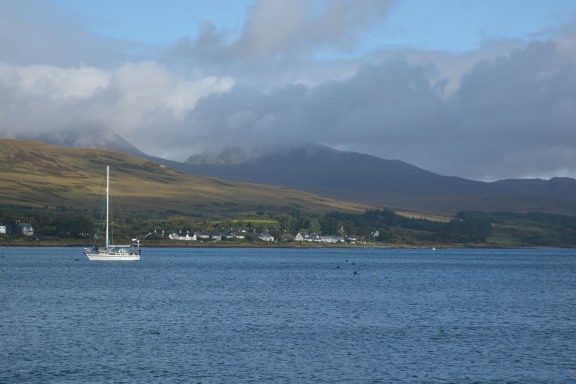
*
The book I took with me to read on this trip was Dorian Lynskey’s The Ministry of Truth, subtitled ‘a biography of George Orwell’s Nineteen Eighty-Four’. Lynskey’s aim in this book is to provide a biographical and cultural analysis of Orwell’s masterpiece, showing how the book came to be written, and the independent life it has gone on to lead in the absence of its author. Lynskey is at pains to stress that Nineteen Eighty-Four came as the culminating achievement of what, in a parallel universe, might have been just the first part of Orwell’s career. Orwell’s experience in the Spanish Civil War set in motion a period of intense thinking, reading and conversation that funnelled itself into the creation of what is, in effect, the summation of Orwell’s ideas on totalitarianism and political ideology. As a foundation stone of twentieth century literature, we can count ourselves lucky that Orwell lived long enough to complete it.
In the second half of his study, Lynskey examines the impact of NIneteen Eighty-Four on both literary and popular culture: through the years of austerity and McCarthyism, the later years of the Cold War, the post-Thatcher crises in unemployment and national identity, right up to the Brexit referendum and the election of Donald Trump. Lynskey reveals how Orwell’s masterpiece – like all truly great works of literature – reinvents itself for each successive generation. Orwell drew his original inspiration primarily from his experience of Stalinist communism, Trotskyite international socialism and the acts of blind obeisance committed by both the British government and the British Labour and Communist parties in effectively eliding the atrocities committed in the name of socialism. But Nineteen Eighty-Four is too big and too brilliant to remain associated with one specific time period alone; it’s a shape-shifting, mutable text, Lynskey argues, the major proof of which resides in the fact that it has been called into service by every shade of political opinion, often at one and the same time.
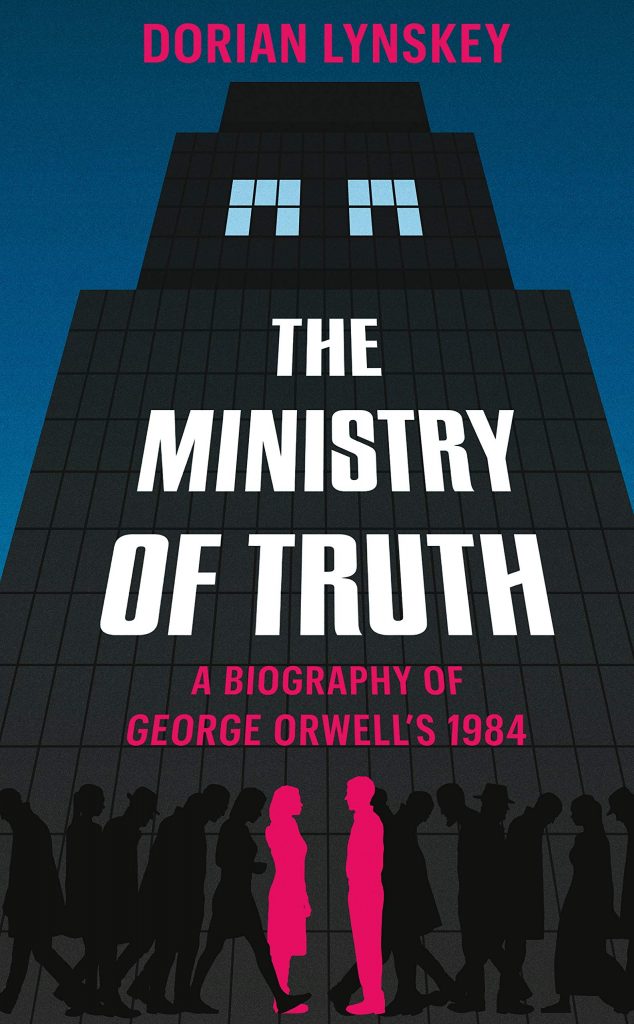
I was so excited and so energised by The Ministry of Truth I couldn’t stop thinking about it, couldn’t stop talking about it. Lynskey’s work is informative, original and addictively readable, one of my books of this year for sure. What it also does – as well it should – is drive you back to the original text. I first read Nineteen Eighty-Four when I was around fifteen years of age and still at school. I read it at least twice more over the following decade – but that was thirty years ago now and although I’ve thought about and referenced the book as often as anyone else, I haven’t reread it. I finished Lynskey’s book with a hunger to put that right – and I’m so glad I did.
When I first read Nineteen Eighty-Four, it was in the context of a lot of other dystopias. The novel that is closest to Orwell’s in terms of its genesis and overall impact is Arthur Koestler’s Darkness at Noon, which I read at almost exactly the same time (it changed my life, but that’s another story). However, my young-adult self never thought to bracket those two books together: in my mind, Koestler’s book was a historical text specifically about the Soviet Union, whereas Orwell’s was a ‘true’ dystopia, set in the future (only a couple of years in my own future by the time I read it, but still) and built around concepts that seemed undeniably science fictional. It felt more natural to me to bracket Orwell’s work with other similarly science fictional novels: Zamyatin’s We, Aldous Huxley’s Brave New World, even Ira Levin’s This Perfect Day, which no one else seems to have read but I was obsessed with at the time.
Rereading Nineteen Eighty-Four as a mature adult reveals how I was both right and wrong: Orwell’s novel is both horrifyingly realist, and one of the most perfect exemplars of the science fictional argument we have to draw on. Save for the unavoidable absence of computers, this novel could have been written yesterday. The fact that Orwell was not in a position to imagine the kind of digital infrastructure that would come to define our world is, in the context of this book, unimportant.
As a younger reader, the parts of Nineteen Eighty-Four that impressed themselves upon me most forcefully were those that were most outwardly expressive of the dystopian mode: the telescreens, the Thought Police, Winston’s hidden diary, the imprisonment and torture. Though my memory of the text proved near-photographic in places, I was astounded to discover on rereading that aside from casual mentions of hangings, and of course the ongoing war with Eastasia/Eurasia (take your pick) there is no overt violence in Nineteen Eighty-Four until someway past the halfway mark. What you get instead is an accumulation of circumstances, a portrait of postwar Britain, with all its griminess, everyday privations and grim sense of stasis that, although seventy years in the past now, will feel immediately resonant and present in our pre-Brexit reality to anyone born in Britain in the analogue age.
There are also minor yet touching details that draw directly from Orwell’s personal circumstances: the way Winston ‘hated using his hands, and he hated bending down, which was always liable to start him coughing’, for example, a detail that reminds us instantly of how the author was suffering from TB at the time of writing, and edging closer to death.
Orwell’s attention to detail extends even to minor characters, Winston’s neighbour Parsons for example, the exemplary Party man who ends up being denounced (for absolutely nothing) by his own daughter. We have all met someone like Parsons, nodded hello to him on a Sunday morning as he washes his car. He’s the kind of man who votes UKIP, the kind who sticks a note through his neighbour’s letterbox during lockdown, warning them that he’s seen them taking an extra exercise session and feels inclined to report them for it. Orwell doesn’t demonise Parsons – he just shows him like he is, pathos included. I especially admired his characterisation of Syme, the passionate stickler who works alongside Winston at the Ministry of Truth, a man whose intelligence has been corrupted into the service of a monstrous master yet whose obsessive interest in his work still makes him interesting to talk to:
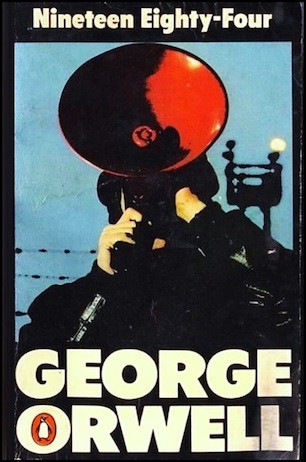
In an intellectual way, Syme was venomously orthodox. He would talk with a disagreeable gloating satisfaction of helicopter raids on enemy villages, the trials and confessions of thought-criminals, the executions in the cellars of the Ministry of Love. Talking to him was largely a matter of getting him away from such subjects and entangling him, if possible, in the technicalities of Newspeak, on which he was authoritative and interesting.
‘It’s a beautiful thing, the destruction of words,’ Syme asserts, before discoursing on the essential redundancy of synonyms and antonyms. ‘Don’t you see that the whole aim of Newspeak is to narrow the range of thought?’ he says. ‘In the end we shall make thoughtcrime literally impossible, because there will be no words in which to express it.’ What struck me most profoundly on reading the novel this time around was how its subject, more than any other, is the importance of language, not only in resisting tyranny but also in maintaining any kind of personal integrity. Anyone who cares about language and words will find Syme’s proposition for the shrinking and coarsening of language literally shiver-inducing, especially as we are already bearing witness to such a transformation across large segments of political and online discourse. One need barely ask what Orwell would have made of phrases such as ‘alternative facts’ and ‘the reality-based community’. If it weren’t so appalling it would be funny. Reading Syme’s words, I also found myself thinking of the ways in which Anglophone culture has forcibly suppressed indigenous languages, gaslighting, devaluing and at the worst extreme obliterating the identity and means of expression of entire peoples.
If I were to pass a negative comment on any aspect of Nineteen Eighty-Four, I would have to say that Orwell is not particularly imaginative in his portrayal of women. Winston’s estranged wife Katherine is referred to as ‘stupid’ and moreover ‘too stupid to detect the unorthodoxy of [Winston’s] opinions’. Wherever prole women are mentioned – and with the exception of an elderly man Winston talks to in a pub the proles described by Orwell are all women – they are invariably described as ‘enormous’, or ‘monstrous’. The idea that these women might have inner lives is never contemplated, and it is only shortly before his arrest that Winston is able to connect a prole woman’s singing with the idea of beauty..
The main female character Julia is bright and bold and courageous but again Orwell seems at pains to stress her physicality. “You’re only a rebel from the waist down,” Winston says to her – Julia is above all a sensuous being, showing no interest in the intellectual reasons behind her rebellion or the life of the mind generally. ‘She hated the Party, and said so in the crudest words, but she made no general criticism of it. Except where it touched upon her own life she had no interest in Party doctrine.’ In spite of his love for Julia, Winston remains fundamentally alone in his search for answers about the nature of the Party and its hunger for power. The idea that women might be equal partners in counter-revolution seems barely to occur to him. Considered on the terms we are offered, Julia is excellently characterised: a warm-blooded, vital creation with a life force that is pivotal within the novel as a whole. Orwell clearly has a blind spot when it comes to feminism, which is a shame. In this respect it is interesting to compare Nineteen Eighty-Four with Zamyatin’s novel We, in which the male protagonist is schooled in the concepts of revolution and intellectual independence by a woman.
Though it might seem incongruous, there are many moments of illuminating beauty throughout Nineteen Eighty-Four, moments that are not often mentioned or remembered but that form a crucial and definitive counterweight to the horror. Winston’s dreams of ‘the Golden Country’ for example, passages that in a sense represent the heart of Orwell’s vision, the necessity of ‘staying sane’ as an act of resistance. There is also much discussion to be had around the ending of Nineteen Eighty-Four. Certainly when I first read the novel all those years ago I had no doubt that Winston’s final assertion, that he loves Big Brother, was a statement of utter defeat, that every last scrap of his integrity had been torn away. This time, I’m not so certain. ‘White always wins’, Winston says, as he moves chess pieces across the board in the Chestnut Tree Cafe, and I had the sense that it was this assertion about the ultimate triumph of good over evil that held the most weight, a coded message almost, even at the last: Winston says he loves Big Brother, but does he truly?
We cannot know – or at least we can only know the answer that feels most true for us. What I do know is that Nineteen Eighty-Four is and remains a landmark work that deserves its fame and status. Not only in its prescience but in its historical acuity, not only in its polemic but in its literary assurance and raw beauty, this is an elegant, complex, mature work of fiction that rewards the reader’s attention on every level. Reading it again brought me not only intellectual satisfaction; I was equally excited to discover how well it has stood the test of time, how relevant this book still feels, precisely today. It also brought me uneasy dreams, a sense of being on the boundary between the known world and the most perilously unstable of futures. To share one’s fear with a like mind in this way is not merely a consolation, but a reason for hope.